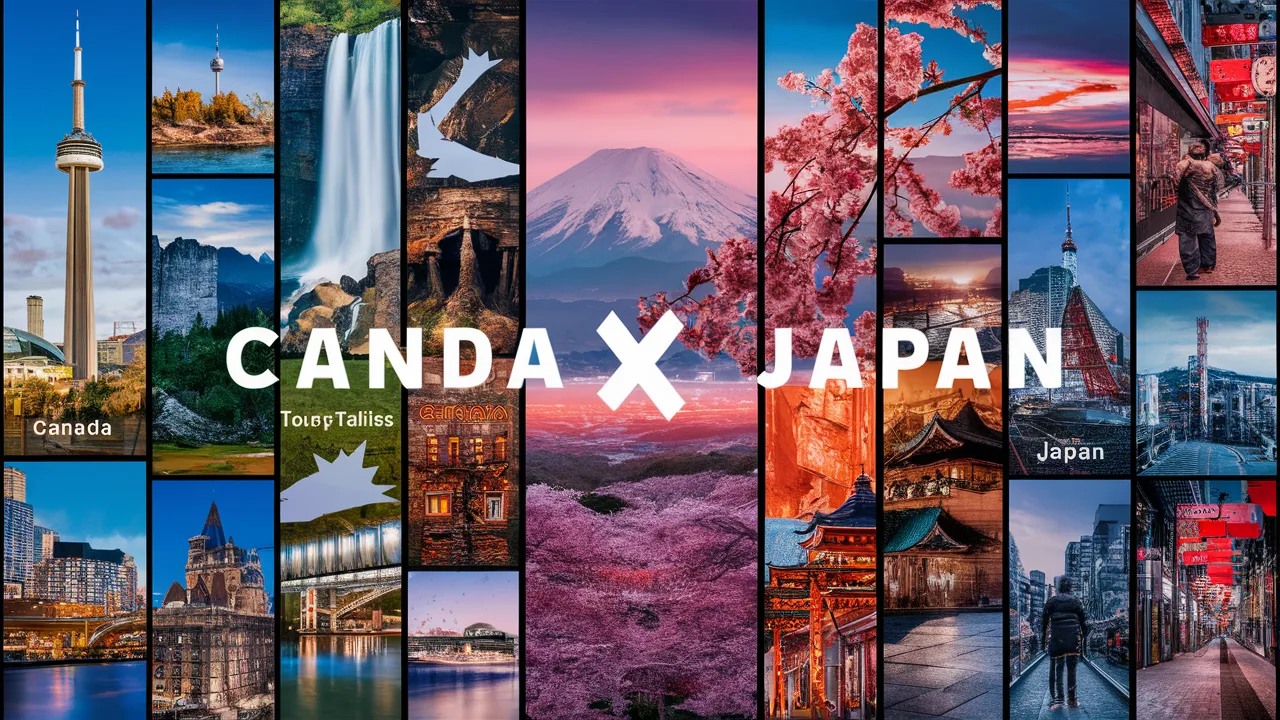
Canada and Japan
Introduction
Background Canada and Japan are captivating countries with rich histories and diverse cultures, each leaving a significant mark on the global stage. Despite their geographical distance, they share intriguing similarities and stark differences. Let’s delve into various aspects of these countries, highlighting their unique and shared attributes, to provide a comprehensive comparison that will surely pique your interest. Canada vs Japan
Geography and Climate
Physical Landscape of Canada
Canada, the second-largest country by land, boasts extensive forests, majestic mountains, and the world’s most extensive coastlines. Its geography spans from the Rocky Mountains in the west to the flat prairies in the central region to the rugged Atlantic coastline in the east, creating a diverse and unique landscape. Canada vs Japan
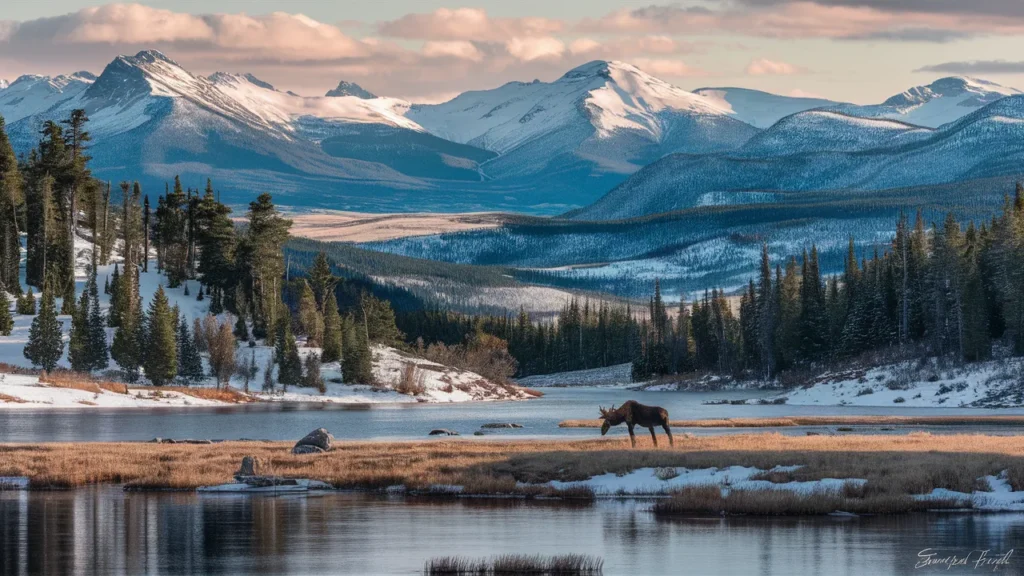
Canada vs Japan
Physical Landscape of Japan
It is an archipelago with long coastlines, numerous mountains, and the great Sumatra Island to the west, named after Mount Fuji, the iconic volcano. Its configuration is narrow but long, and thus, its climates range from the snowy winters in Hokkaido to the subtropical climate in Okinawa.
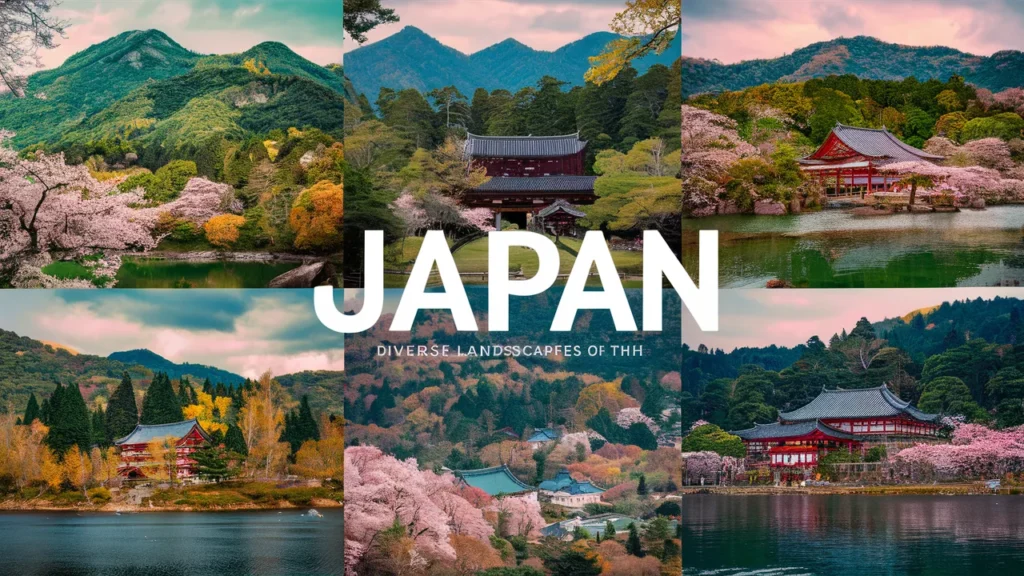
Canada vs Japan
The climate differences and its impact
Canada has a highly varied climate that stretches across more than a vast territory, from the Arctic region in the north to temperate climates in the southern regions. The differences these create affect the way we live, agriculture, and economic activities. Nature Japan is unusual because it experiences all four seasons in a year. This involves the way of life of the people and nature life. The impact of these climatic differences is immense, playing a significant role in each country’s daily life and traditions.

Canada vs Japan
History and Culture
Brief History of Canada
Canada, a country shaped over centuries by First Nations culture, European exploration, and colonial rivalries, officially formed the Dominion of Canada in 1867 and achieved full sovereignty in 1982. It is a land of immigrants and diversity, a testament to its rich and varied history.
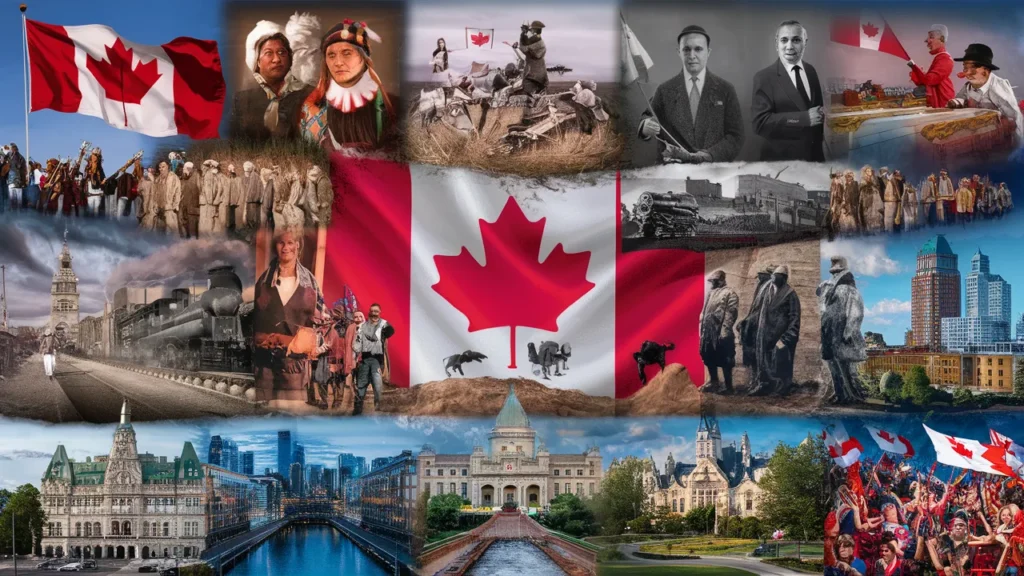
Canada vs Japan
Brief History of Japan
Japan has a long, tumultuous history dating back thousands of years, marked by isolationism and interaction with the broader world. After being divided into four states throughout its history, Japan experienced rapid modernization in the 19th century during the Meiji Restoration and rose as a world power in the early 20th century. When we look at Japan’s past, we see that the books represent the amalgamation of tradition and technology deeply intertwined into its respective lines of cultural undertakings.

Canada vs Japan
Cultural similarities and differences
Canada and Japan both cherish their history and traditions, but their cultural landscapes are vastly different. Japan is predominantly ethnically Japanese, while Canada is a vibrant mosaic of cultures, with a significant portion of its population born abroad. This cultural diversity shapes societal norms, celebrations, and everyday experiences, adding depth and richness to these countries’ cultural tapestries.
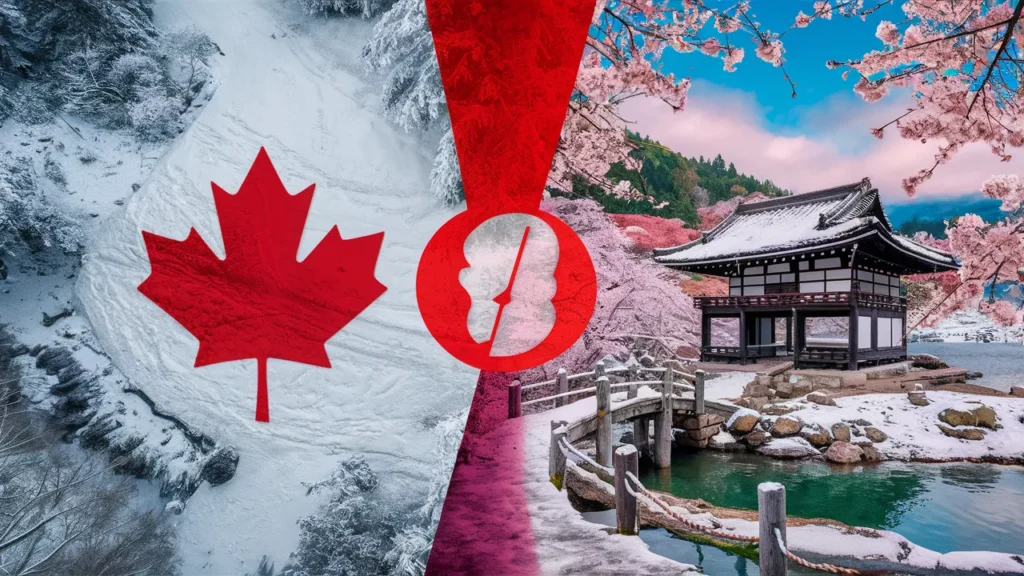
Canada vs Japan
Economy and Industry
Overview of Canada’s Economy
Canada’s economy is fueled by a wealth of natural resources, manufacturing, and services. The primary industries, including oil and gas, mining, agriculture, and fisheries, are supported by a developed financial services sector. Notably, Canada’s economic health is largely dependent on trade with the US, highlighting its global economic significance.

Canada vs Japan
Overview of Japan’s Economy
Known for its cutting-edge technology and manufacturing industry, especially in the field of cars and electronics, Japan is an exciting place to be. Japan has a small fraction of its domestic land categorized as arable, but its economy is still highly industrialized and heavily relies on imported raw materials and energy. Its economic policies focus on innovation and efficiency.

Canada vs Japan
Key Industries in Canada
Canada has an abundance of natural resources that benefit its economy significantly. Alberta, in particular, is a major economic driver for oil and has an industry. Canada is also one of the largest producers of minerals and agricultural products, including wheat and canola.
Key Industries in Japan
Already world-famous in technology and manufacturing, Japan’s companies like Toyota, Sony, and Panasonic remain global leaders. Automobiles form the base of the USA’s economy, followed by major industries like electronics, robotics, and biotechnology.

Canada vs Japan
Education Systems
Education System in Canada Structure
Canada has a decentralized education system where each province and territory is accountable for its education policy. The Traditional education system is organized into primary, secondary, and post-secondary levels and tends to be compulsory up to a certain age. It focuses on ensuring that students learn how to learn and demands that they show equivalence in what they learn before they are allowed to move on.
The Education System in Japan
The Japanese education system is intense and hierarchical, characterized by excellent quality and high levels of competition. The system is divided into six years of elementary school (3 years 1, considered part of preschool education two and known as kindergarten), three years of junior high school, three years of high school, and various post-secondary options.
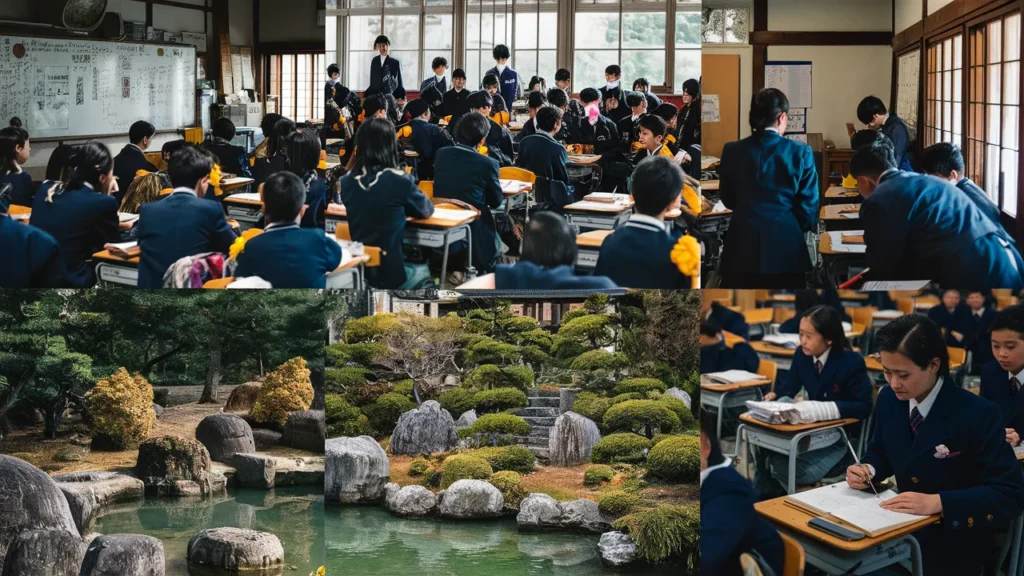
Canada vs Japan
Education Outcomes+ Global Ranking
According to global education standards, the two countries were scored among the best globally, and Japan is generally ranked number 1 in mathematics and science. A balanced approach to critical thinking and creativity pays dividends in international assessments for Canadian students.
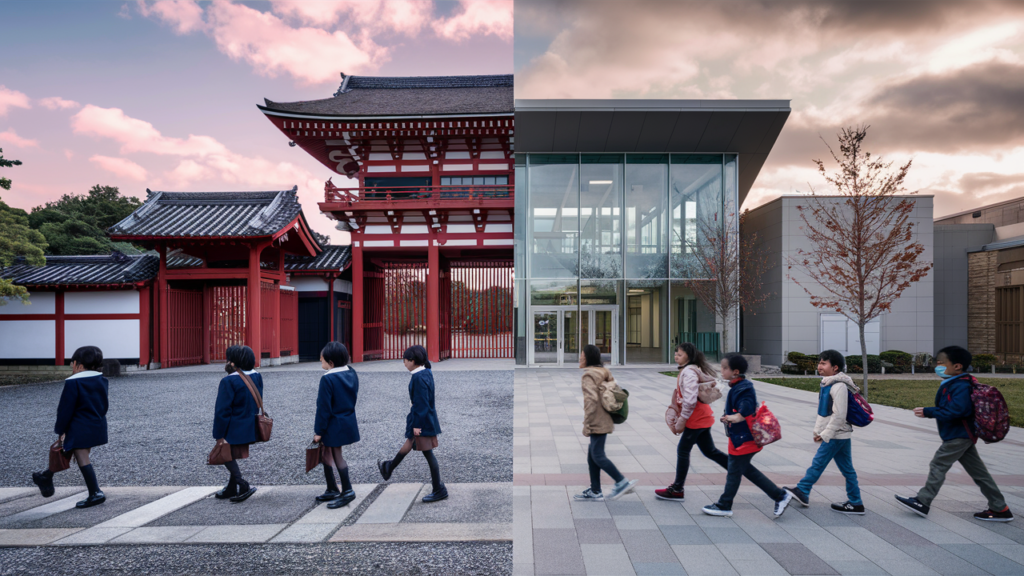
Canada vs Japan
Political Systems
Canadian Government Structure
Canada is a political democracy in this reciprocal monarchy. The Prime Minister is the head of government, and the monarch, represented by the governor general, is the ceremonial head of state.
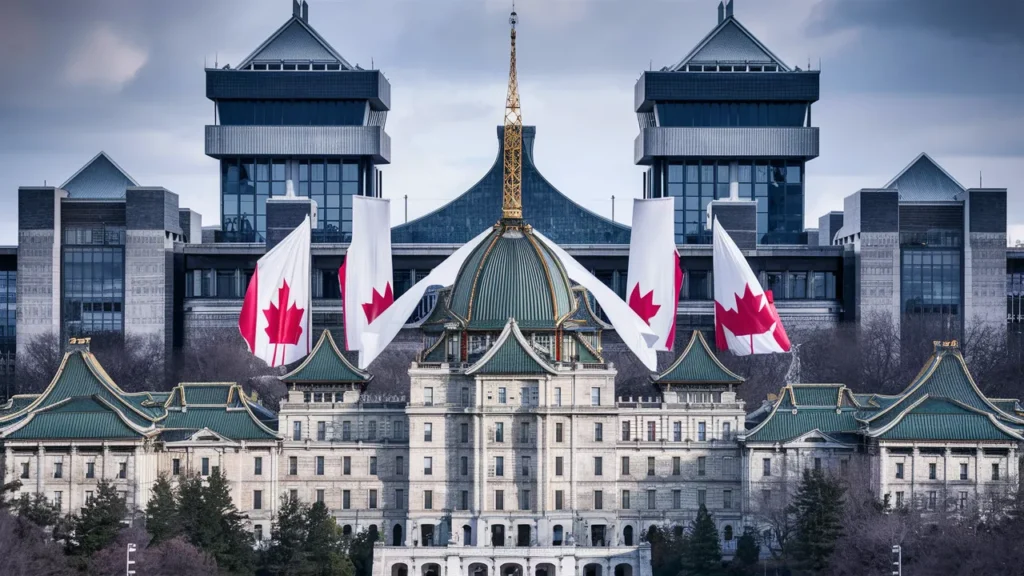
Canada vs Japan
Government Structure in Japan
Japan has a parliamentary government and a constitutional monarchy. The Emperor is simply a ceremonial head of state, whereas the Prime Minister is the head of government. Japan’s political system is timeworn and stable.
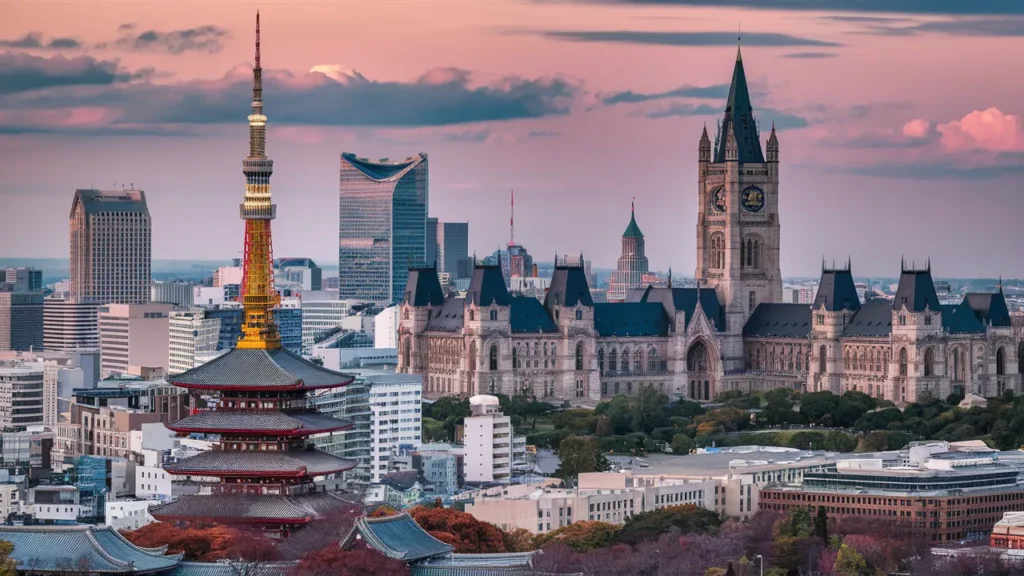
Canada vs Japan
Current Political Map and Recent Movements
Canadian politics operates under a multi-party system, and many political issues intersect with healthcare, global warming, and the rights of indigenous peoples. The Liberal Democratic Party is the ruling party in Japan today, and in recent months, the national focus has been on economic reform and regional security.
Languages
Official Languages in Canada
The official Language of Canada is bilingual. Canadian is an official language, like English and French, if we were to output it in the Canadian way. This bilingualism reflects the country’s colonial history and cultural diversity, especially in provinces like Quebec.

Canada vs Japan
Official Languages in Japan
Japan’s only official language is Japanese, which is deeply rooted in the country’s culture. Although English is prevalent across schools, the fluency of the general population population varies.
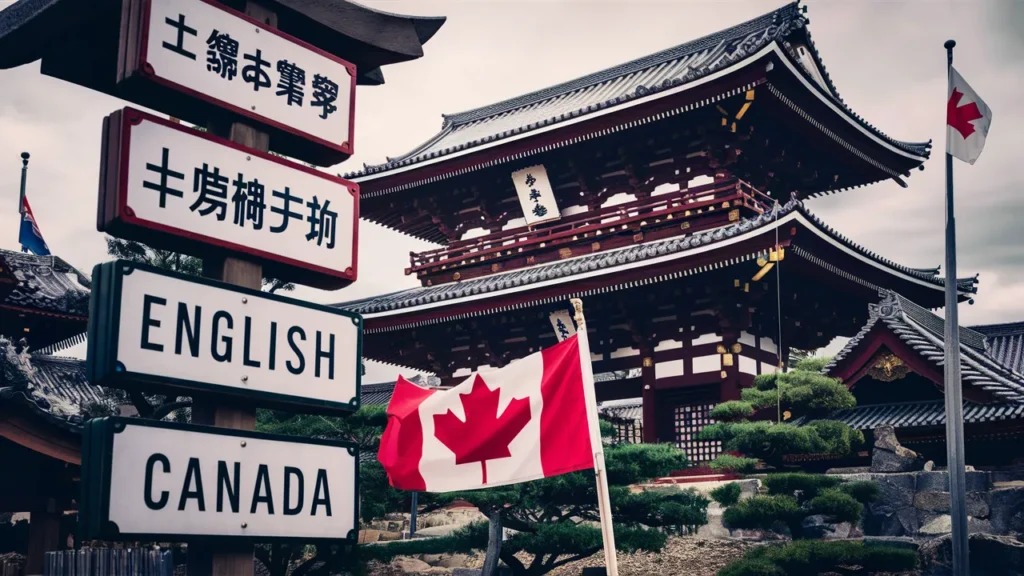
Canada vs Japan
English in Both English-speaking Countries
One of the principal languages of communication in Canada is English. It is a critical second language in Japan, especially in international business and tourism, but less than less than in everyday life.
Population and Demographics
Population of Canada Size and Density
It is worth mentioning that Canada has a population of around 38 million. Given its immense land mass, its population density is amongst the lowest in the world. The largest cities include Toronto, Vancouver, and Montreal.
Japan — Population Size, Density — 9 Korea Age: def;}.layoutControlItem {position: absolute;right:100;top:0}.’ MediumSoftAge10pt’It may be hard to read a map showing Japan’s population density.
Japan has a population of about 126 million and a significant population density, especially in urban areas such as Tokyo, Osaka, and Yokohama. The coronavirus crisis has accentuated problems related to an ageing population and declining birth rates.
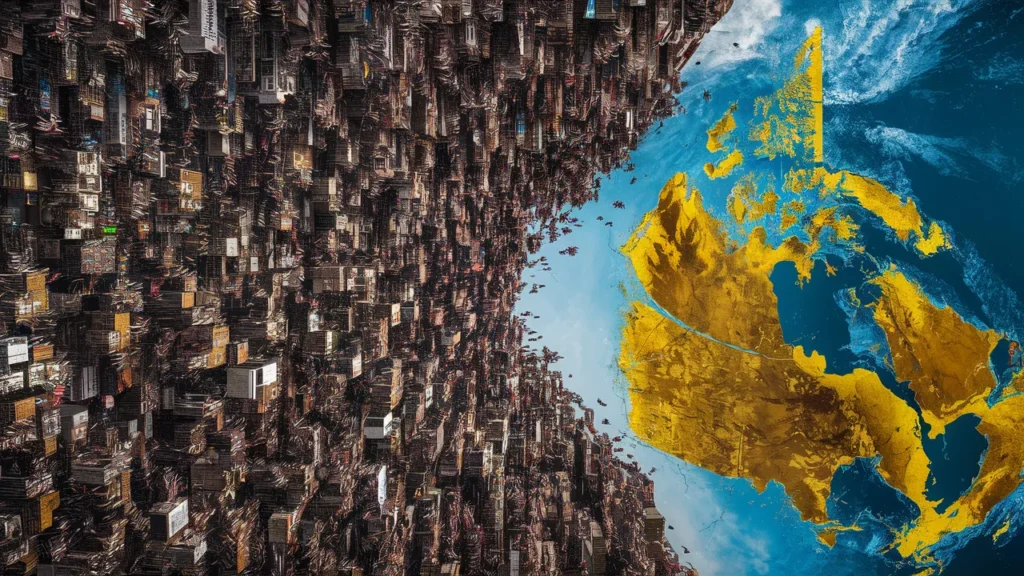
Canada vs Japan
Demographic Changes and Their Implications
Immigration-powered, multicultural society of Canada Such policies are predicated on Japan’s rapidly shrinking workforce and the economic fallout of an ageing population.
Healthcare Systems
Canada Health System Overview

Canada vs Japan
Canada: Publicly funded, universal coverage (all residents). The system is well-established and known for its quality of care and its principles of prevention and equity.
A Tour of Japan’s Healthcare System
Japan’s health care system is a hybrid, combining universal health insurance with private providers. The latter is a high-tech system emphasizing preventive medicine and is acknowledged for its efficiency and high quality of care.

Canada vs Japan
Healthcare Outcomes & Rankings
Both rank among the best in global healthcare metrics: Canada for accessibility and wide-ranging coverage and Japan for longevity and effective public health measures.
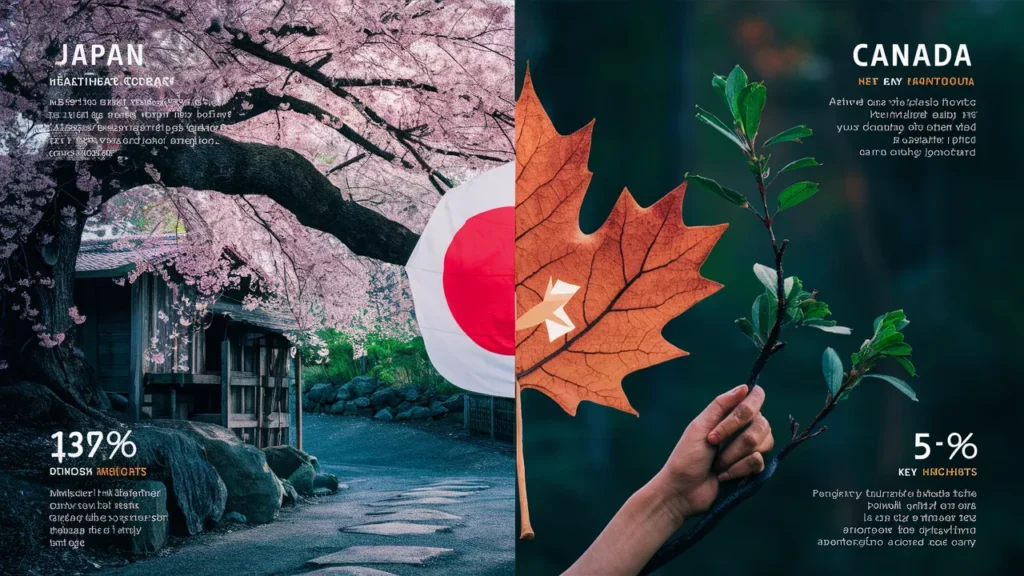
Canada vs Japan
Technology and Innovation
Canada and Tech Progressions
Canada has an edge in terms of innovation in fields like artificial intelligence, biotechnology, and clean technology. Canada has some of the world’s most dynamic tech ecosystems, with cities such as Toronto and Vancouver. Some places, like the Greater Toronto Area, the Kitchener-Waterloo region, and British Columbia cities, are already known for their vibrant tech sectors.

Canada vs Japan
Technological Advances in Japan
Japan is one of the world’s leading nations in technology, especially in robotics, consumer electronics, and automotive engineering. Its dedication to research and development ensures ongoing innovation.

Canada vs Japan
READ ALSO: Selected Innovators & Their Achievements
The best innovation hubs in Canada are Toronto, which has the MaRS Discovery District, and Vancouver, which has the tech scene. For example, such innovation could be seen within Tsukuba Science City and, more generally, at the Kyoto Research Park — one of several Silicon Valley-like clusters in Japan.

Tourism and Travel
Table of Contents Major Tourist Attractions in Canada
Every year, millions of tourists visit Canada to see its natural beauty. Its primary draw cards include the Rocky Mountains, Niagara Falls, Banff National Park, and Toronto and Vancouver are full of life and adventure.
Points of Tourist Interest In Japan
Japan is an amalgam of ancient places and new sites. Top tourist attractions include the capital city of Tokyo, the ancient city of Kyoto, Mount Fuji, the Hiroshima Peace Memorial, and the hot springs of Hakone.
Experience in Travel and Cultures
Canada can provide everything for your travelling needs, no matter if you seek the grand landscapes of the north or multicultural experiences in one of the myriad cities across the great white north. From ancient traditions to delightful foods and modern cities, Japan has been desirable for festivals, unique cuisine, and historical remnants.
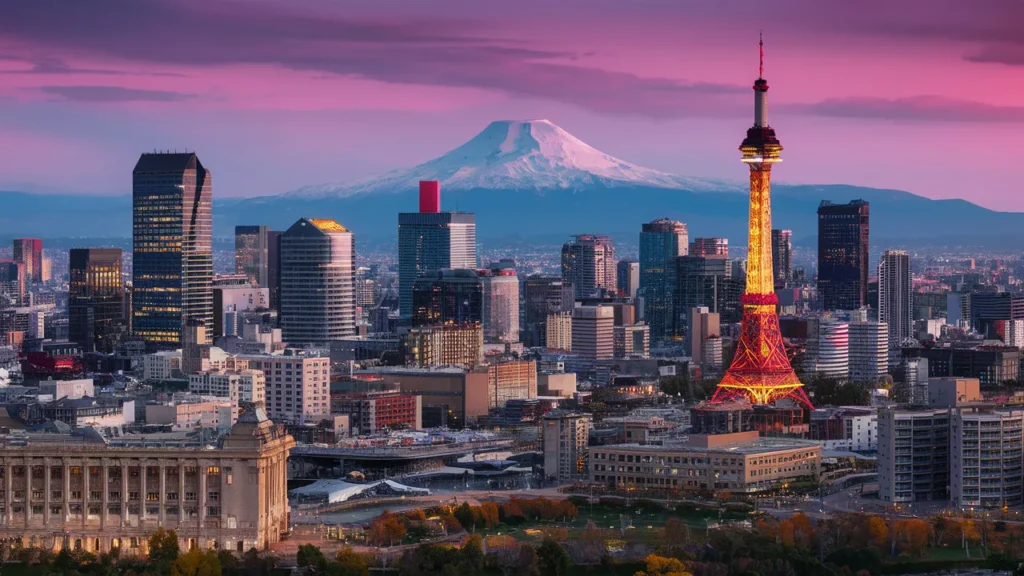
Food and Cuisine
Traditional Canadian Dishes
Canadian cuisine has been shaped by the nation’s cultures and variations on popular dishes; the Canadian extensive Cuisines Very best known ingredients of those dishes are poutine, butter tarts, and sugar pie. The food culture is unique in every region, from the Atlantic coast’s seafood-focused menus to the cities’ diverse menus.
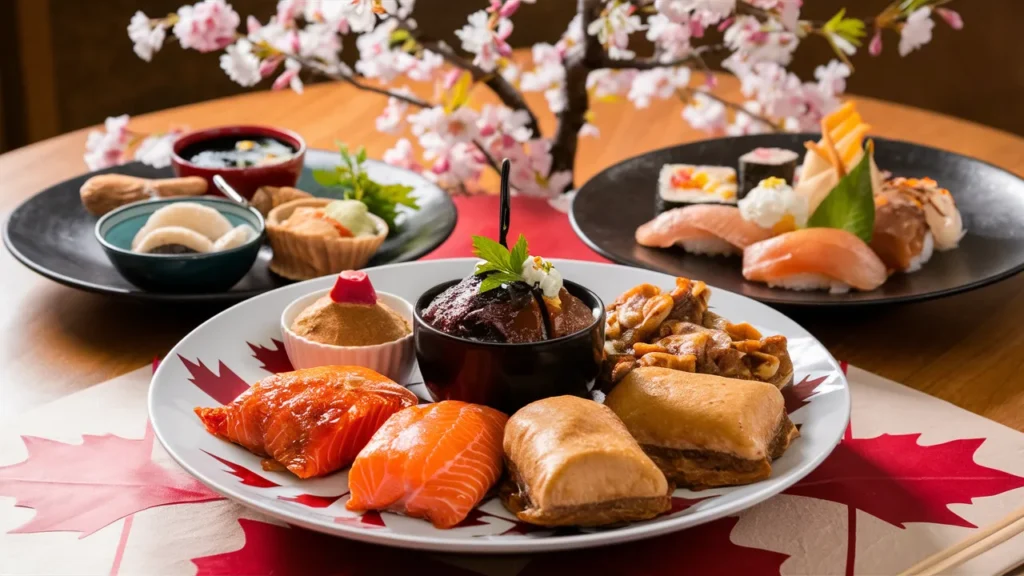
Traditional Japanese Dishes
When it comes to Japanese food, we automatically think of how light and fresh it can be, alongside the attention to detail in preparation. Its staples are sushi, ramen, tempura, and miso soup. Japanese food culture also stresses presentation and how well flavours complement each other.

How Cuisine Influences Culture
A History of Multiculturalism from Around the Globe: Canada celebrates its diverse and international heritage through food. Cuisine in Japan is embedded deeply in tradition and seasonal change, and in this respect, it reflects a reverence for nature and craftsmanship.
Sports and Recreation
Popular Sports in Canada
In Canada, ice hockey has a large following at both professional and amateur levels. It is a national pastime. Ice hockey, lacrosse, college soccer, and Canadian football are also popular.

Popular Sports in Japan
Baseball is Japan’s national sport, followed by soccer and sumo wrestling. The country has also performed magnificently in martial arts like judo and karate.

Parks, Rec, and Open Spaces
Canada offers many outdoor activities, from skiing and snowboarding in the Rockies to hiking and kayaking in the summer. Japan offers hot spring baths (onsen), cherry blossom viewing (hanami), and vast urban parks for leisure pursuits.
Environmental Policies
An Environmental Conservation Model from Canada
Their attention is turned to preserving the environment, and they have conducted policies to reduce carbon emissions, conserve natural habitats, and encourage the use of renewable energy, making them a leader in environmental conservation. The nation is also a party to global treaties like the Paris Accord.
Cutting-edge Japanese Environmentalism
Japan focuses on strict regulations and innovative technology for environmental protection. The nation is noted for its recycling programs, energy conservation, and anti-climate change work.
Progressive Environmental Policy
Some of the key Carbon Pricing and green infrastructure investments in Canada are in Japan, which is focused on pushing energy-saving technologies, planting trees to absorb carbon, and tackling plastic waste.
Conclusion
Both Canada and Japan have unique cultures and histories. They also place great importance on their unique heritage, technological advancements, and environmental consciousness. This comparative no doubt reflects the distinction in shared values between a couple of the more excellent nations in the Balkan peninsula. Each country has something of far-reaching value, whether it’s its many terrains, the many chapters of its history, or the business development models each offers to a global community.
FAQs
Differences Between Canada and Japan
CANADA VS JAPAN This is a large country with ten provinces representing a total of 38 million people, and the Population is similarly diverse territory-wise; the size difference is most evident from a population point of view if you compare Japan with those same provinces, collectively they would not even be as big as Japan, the Population of japan is smaller than that in just one of the provinces (to put it in perspective). Canada is sparsely populated, with a society derived from many cultures, while Japan is an island nation with a relatively high population density and a large monolithic society.
Education System of Canada vs Japan
Canada’s education system is decentralized and stresses inclusiveness, while Tokio’s is highly structured and competitive. While both nations have high-quality educational systems, their styles of teaching and learning differ.
Canada vs Japan: Who Has the Best Health Care System?
Canada and Japan have great healthcare systems. Canada has universal healthcare paid through taxes: every citizen has the right to access it equally. It is a mix of public and private services and is known for service delivery and quality efficiency.
Top 5 most visited places in Canada and Japan?
The Rocky Mountains, Niagara Falls, and Banff National Park are some of Canada’s top sites. Tokyo, Kyoto, Mount Fuji, and the Hiroshima Peace Memorial are among Japan’s main attractions.
This is a fundamental question: How do Canada and Japan respect nature?
Canada is concentrating on decreasing carbon emissions, conserving natural habitats, and endorsing eco-friendly energy. Japan promotes energy conservation, recycling, and the development of state-of-the-art technologies in environmental fields in efforts to reduce the impact of global warming.
Author: CENTNETWORK
Courtesy: EPICMAZE
